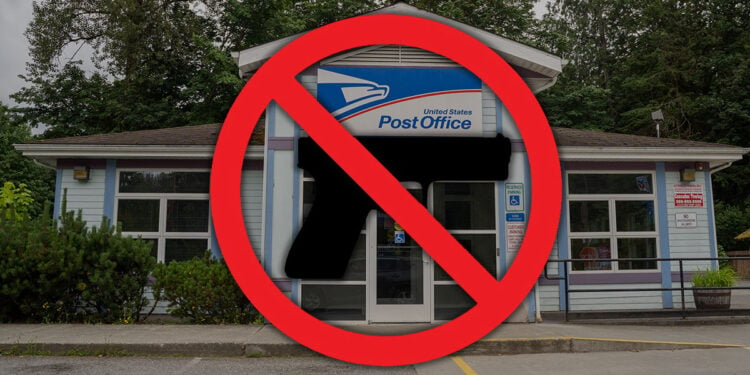FORT WORTH, TX — A federal judge in the Northern District of Texas has ruled that the long-standing federal ban on firearms inside United States Post Offices and on surrounding postal property is unconstitutional as applied to members of the Firearms Policy Coalition (FPC), the Second Amendment Foundation (SAF), and two named Texas plaintiffs.
Chief District Judge Reed O’Connor granted summary judgment to the plaintiffs, striking down 18 U.S.C. § 930(a) and 39 C.F.R. § 232.1(l) as applied to the prohibition on carrying firearms for self-defense at what the court defined as ‘ordinary’ post offices.” These are stand-alone post offices not located on military bases or inside multi-use federal facilities that house other government functions where firearms would otherwise be prohibited.
Who is Covered
- Two Texas license holders named as plaintiffs
- Members of Firearms Policy Coalition (FPC)
- Members of Second Amendment Foundation (SAF)
For these groups, the ruling provides both declaratory and injunctive relief, meaning the government is barred from enforcing the ban against them in ordinary post offices and on postal property such as parking lots.
Real-World Considerations
Although legally protected, those covered should exercise caution:
- Awareness Gap: Postal employees and some law enforcement officers may not yet know about this new ruling. Signs banning firearms will likely remain posted until USPS formally updates its policies.
- Potential Confrontations: Someone openly carrying could still be questioned or reported despite being legally covered.
- Concealed Carry Advantage: If you are carrying concealed and are legally covered as a SAF or FPC member (or named plaintiff), no one should know you are armed, reducing the chance of conflict.
It is critical that individuals ensure they are active SAF or FPC members before relying on this injunction, as the relief is limited to those groups and the specific plaintiffs.
Why It Matters
Millions of Americans visit the post office each week, and until now, federal law forced them to leave their lawfully carried firearms behind. SAF Executive Director Adam Kraut highlighted the importance of this ruling, noting that there is no historical tradition of banning firearms in post offices. FPC President Brandon Combs emphasized that “governments cannot ban weapons in unsecured public spaces, full stop.”
The ruling is another application of the Bruen framework, which requires the government to point to a relevant historical analogue if it wants to restrict conduct covered by the Second Amendment. Judge O’Connor concluded that no such analogue exists for post offices, noting that the Founders themselves never imposed such bans.
This is a major legal win for FPC, SAF, and their members, but as with all recent court victories, practical implementation may lag behind the ruling. Those covered should remain cautious and informed.











If it is “unconstitutional” for those apparently somehow special groups, how can it not be also unconstitutional for EVERYONE?
Unconstitutional is just that…unconstitutional and the U.S. Constitution supercedes all other laws in the U.S., so how could such a finding possibly be segregated by group, affiliation, or participation in a single court case?
What other law says “this” is unconstitutional if you’re Citizen A, but police can do whatever they want to do if you’re Citizen B?
Like enter your house without probable cause or warrant?
(1 court ruling later)…
It’s now OK for police to do that to any person who is NOT a member of the private $100 dues/year organization, “I Support the Police”? So…join up so you too can BUY your constitutional right!
I agree with you jGecko!!
Neither a federal judge nor USA Carry can pick and choose who a constitutional ruling applies to.
That would be completely nonsensical.
There seems to be an issue with clarity regarding the ruling in this case. Perhaps people are confusing this with “Reese v. ATF” which clearly states in the ruling that ONLY plaintiffs “in the 5th District” are covered, while FPC v. Bondi state FPC and SAF “members… regardless of date of membership”, which “should” cover all FPC and SAF members nationwide. Some reference recent SCOTUS emergency rulings on blanket nationwide injunctions against President Trump “as cases progress”, but this case was a class action that withstood to judgement on the merits. The ONLY way I (NOT an attorney, ASKING FOR CLARIFICATION) can interpret this (FPC v. Bondi) ruling is “ALL MEMBERS”. I have not had one single attorney weigh-in on this question yet when I have asked it (several times now) so, attorneys, please let your testes drop and weigh-in!